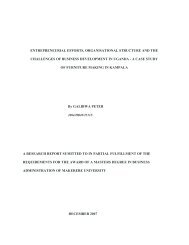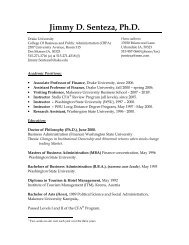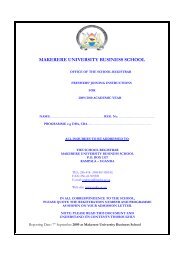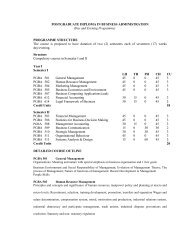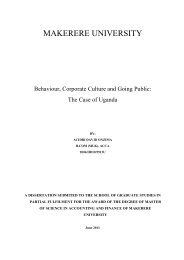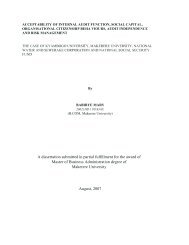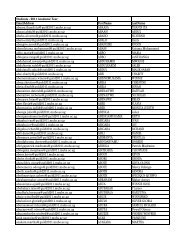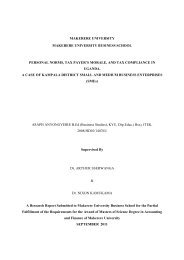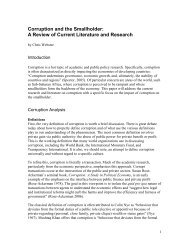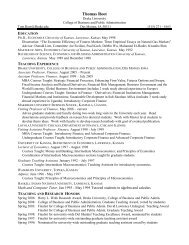13th Annual International Management Conference Proceeding
13th Annual International Management Conference Proceeding
13th Annual International Management Conference Proceeding
You also want an ePaper? Increase the reach of your titles
YUMPU automatically turns print PDFs into web optimized ePapers that Google loves.
The Impact of Entrepreneurship Training Programmes on Small Enterprise Development and Growth in Kenya<br />
By<br />
Samuel Obino Mokaya 9<br />
Jomo Kenyatta University of Agriculture and Technology, Kenya<br />
Abstract<br />
Any entrepreneurship training should be designed to include or at least reveal and develop entrepreneurship in an<br />
individual. Carefully designed training programmes should be based on needs; linked to opportunities and<br />
complimented with follow-up and evaluation to determine whether trainees start new enterprises or make<br />
improvements on existing ones.<br />
The purpose of this study was to determine the contribution of entrepreneurship training prgrammes to the<br />
development and growth of small enterprises in Kenya: the extent to which the training had helped the entrepreneurs<br />
improve performance of their businesses. This was a descriptive study involving a survey of the perceptions of the<br />
participants in the training programmes conducted by three institutions and the impact of the skills provided to the<br />
development and growth of their businesses. The study covered past trainees of entrepreneurship training programmes<br />
at the Kenya <strong>Management</strong> Assistance Programme, Federation of Kenya Employers and Improve Your Business. Data<br />
was collected using semi-structured questionnaires administered through personal interviews at their business premises.<br />
Results indicated that most of the trainees had experienced improved business performance as result of the training.<br />
Further, the improvements made were not exclusively due to the training but in combination with other factors.<br />
However, the training had been a major factor in the improvements made. The study concluded that the training was<br />
useful and instrumental in the improvements made despite existence of other factors. The study recommends that<br />
training providers should assess needs of entrepreneurs as basis for training; have sector-specific sessions; practical<br />
training techniques; establish linkages with credit providers for credit provision to trainee and inclusion of a session on<br />
prudent financial management practices in the training can also expose entrepreneurs to innovative ways of mobilizing<br />
their own funds through savings either individually or in groups for reinvestments; assist trainees prepare statements of<br />
what they propose to do in form of business plans, action statements or proposals as commitment to implementing<br />
what they have learnt and also provide basis for future evaluations.<br />
Keywords: Assessment, impact, entrepreneurship training, enterprise development and growth<br />
1.0 Background to the Study<br />
Entrepreneurship training has been widely recognized as an important component in the strategy for small<br />
scale and jua kali enterprise development in Kenya (G.O.K., 1992). According to the Sessional Paper No. 2<br />
of 1992 and the National Strategy for Small Scale and Jua Kali Enterprise Development: Towards the Year<br />
2000, deficiency in managerial skills has been cited as one of the major bottlenecks in the development and<br />
growth of small enterprises.<br />
As a result several public and private sector institutions have been established to address this need. It is on<br />
this background that the Kenya <strong>Management</strong> Assistance Programme (K-MAP), Improve Your Business<br />
(IYB) and the Federation of Kenya Employers (FKE) with assistance from <strong>International</strong> Labour<br />
Organization and United Nations Development Programme among others, conducted a number of business<br />
development and growth training programmes. The training was aimed at enhancing the performance of<br />
small enterprises in the country through business improvement and expansion. The training programmes are<br />
targeted at entrepreneurs who were already in business so as to enable them identify growth potential of their<br />
businesses and plan for strategic business growth for employment creation.<br />
9 Samuel Obino Mokaya is an Assistant Registrar (Production) and Part-time Lecturer in Entrepreneurship<br />
& <strong>Management</strong> at Jomo Kenyatta University of Agriculture and Technology. He is also a 2 nd year Ph.D.<br />
student in Entrepreneurship Development at Kenyatta University (skomokaya@yahoo.com)<br />
83



